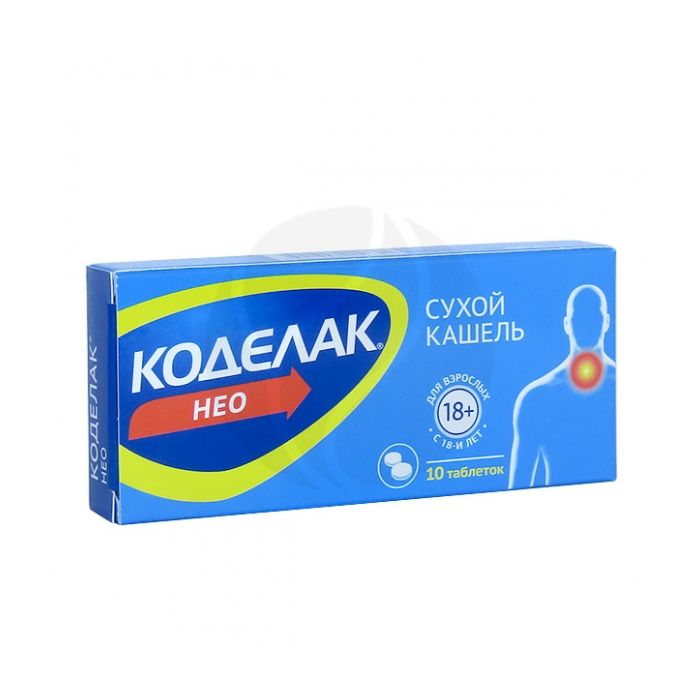Codelac Neo tablets 50mg, No. 10
Expiration Date: 05/2027
Russian Pharmacy name:
Коделак Нео таблетки 50мг, №10
-Dry cough of any etiology (with colds, flu, whooping cough and other conditions);
- suppression of cough in the preoperative and postoperative period, during surgery and bronchoscopy.
Inside, before meals.
If the cough persists for more than 5 days after starting treatment, you should consult a doctor.
Modified release film-coated tablets
Without chewing. 1 table. every 8-12 hours
Modified release film-coated tablets
1 tab.
active substance:
butamirate citrate (in terms of 100% substance) 50 mg
excipients: lactose monohydrate (milk sugar) - 241 mg; hypromellose (methocel K4M) - 85 mg; talc - 4 mg; magnesium stearate - 4 mg; colloidal silicon dioxide (aerosil) - 6 mg; low molecular weight povidone (low molecular weight polyvinylpyrrolidone) - 5 mg film shell: Opadry II white 57M280000 (in the form of a powder containing hypromellose (15 cP) - 5.58 mg, titanium dioxide - 4.86 mg, polydextrose - 4.68 mg, talc - 1.26 mg, maltodextrin / dextrin - 0.9 mg, glycerin / glycerol - 0.72 mg) - 18 mg
-Hypersensitivity to the components of the drug;
-pregnancy (I trimester);
-the period of breastfeeding;
- fructose intolerance (drops for oral administration, syrup);
-lactose intolerance, lactase deficiency, glucose-galactose malabsorption (modified release film-coated tablets)
-Children up to 2 months (drops for oral administration), up to 3 years (syrup), up to 18 years (modified release tablets, film-coated).
Pharmacodynamics
Butamirate, the active ingredient of CodelacЃ Neo, is a centrally acting antitussive agent. Does not apply to opium alkaloids, either chemically or pharmacologically. Does not form addiction or addiction.
Suppresses cough, having a direct effect on the cough center. It has a bronchodilating effect (expands the bronchi). Helps to facilitate breathing, improving spirometry (reduces airway resistance) and blood oxygenation (saturates the blood with oxygen).
Pharmokinetics
Absorption is high. After oral administration of a prolonged-release tablet, the maximum plasma concentration of the main metabolite (2-phenylbutyric acid) is observed after 9 hours and is 1.4 ?g / ml.
Hydrolysis of butamirate, initially to 2-phenylbutyric acid and diethylaminoethoxyethanol, begins in the blood. These metabolites also have antitussive activity, and, like butamirate, to a large extent (about 95%) bind to plasma proteins, which causes their long half-life. 2-phenylbutyric acid is partially metabolized by hydroxylation. With repeated administration of the drug, cumulation is not observed.
The half-life of butamirate is 13 hours. Metabolites are excreted mainly by the kidneys. Moreover, 2-phenylbutyric acid is mainly excreted in the form associated with glucuronic acid.
Overdose
Symptoms: nausea, vomiting, drowsiness, diarrhea, abdominal pain, dizziness, irritability, decreased blood pressure, impaired coordination of movements.
Treatment: gastric lavage, activated charcoal, saline laxatives, symptomatic therapy (if indicated).
Side effects
From the side of the nervous system: rarely - drowsiness, dizziness, which disappears when the drug is discontinued or the dose is reduced.
From the gastrointestinal tract: rarely - nausea, diarrhea.
On the part of the skin and subcutaneous tissues: rarely - urticaria, the development of allergic reactions is possible
Special conditions
Each tablet contains 241 mg of lactose. The drug is contraindicated in patients with lactose intolerance, lactase deficiency, glucose-galactose malabsorption.
Influence on the ability to drive vehicles and mechanisms
It is recommended to refrain from driving vehicles and engaging in other potentially hazardous activities that require increased concentration of attention and speed of psychomotor reactions, since the drug can cause drowsiness and dizziness.
Drug interactions
No drug interactions have been reported for butamirate. During the period of drug treatment, it is not recommended to consume alcoholic beverages, as well as drugs that depress the central nervous system (hypnotics, antipsychotics, tranquilizers and other drugs).
Due to the fact that butamirate suppresses the cough reflex, the simultaneous use of expectorants should be avoided in order to avoid the accumulation of sputum in the respiratory tract with the risk of bronchospasm and respiratory tract infection.

